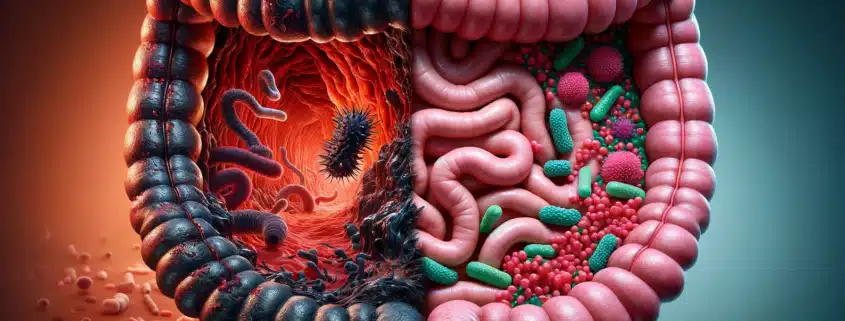24 Ways to Boost Gut Health with Probiotics
Here are 24 best ways to boost gut health with probiotics in this Gut Health article with Jonathan Bailor!
Prepare to embark on a journey to improve your gut health with a friendly guide who cares about your well-being. This is not a generic health lecture but a personalized conversation catering to your needs and goals. You are a unique individual, and you deserve to feel your best.
Gut health is crucial for overall well-being, regardless of age or background. And probiotics can help you achieve it. Probiotics are friendly microorganisms that act as superheroes in the gut. They work behind the scenes to ensure your digestive system functions smoothly, support your immune system, and even affect your mood. The best part is that they are easy to incorporate into your daily routine.
Take care of your gut better with our Avoiding Holiday Bloat: 6 Ways to be Less Gassy During the Holidays and 26 Habits to Improve Gut Health with Probiotics at Every Stage of Life guides next!
Our mission is simple: to provide you with actionable, science-backed tips to boost gut health with probiotics. By reading through these 24 ways to improve your gut health with probiotics, you’ll gain valuable knowledge and feel empowered to take control of your health journey. And that’s something worth sharing with your friends and family.
So get ready to absorb the wisdom, share the knowledge, and take the first step toward a healthier you. Together, we can all embrace better gut health and live our best lives.
Improving Your Gut Health: Lifestyle Changes Beyond Diet and Activity to Support Natural Probiotics
1. Prioritize Quality Sleep
In the quest for better gut health, don’t underestimate the power of a good night’s sleep. Quality sleep is like a reset button for your body, which is crucial to maintaining a healthy gut. During deep sleep, your body performs essential maintenance tasks, including repairing and renewing gut tissues. Disrupted sleep patterns can lead to imbalances in your gut microbiome and reduced probiotics, potentially causing digestive issues and inflammation. Try to get 7-9 hours of quality, uninterrupted sleep each night to give your gut the restorative break it deserves.
2. Manage Stress Levels
Chronic stress can severely harm your gut health. When stressed, your body’s fight-or-flight response can disrupt the balance of beneficial (probiotic) bacteria in your gut. This imbalance may lead to digestive problems and weakened immunity. Incorporate stress management techniques, such as meditation, deep breathing exercises, or yoga, into your daily schedule. These practices can help soothe your mind and create a more harmonious environment for your gut microbiome.
3. Establish Regular Eating Habits
Consistency in your eating schedule can benefit your gut health. Irregular eating patterns, like skipping meals or eating at inconsistent times, can disrupt the natural rhythms of your digestive system. This inconsistency may lead to digestive discomfort and imbalances in your gut flora. Try to establish a regular eating routine by consuming meals and snacks at consistent intervals throughout the day. Your gut will appreciate the predictability, and it can contribute to better digestion.
4. Limit Alcohol Consumption
While we’re not delving into dietary changes, it’s worth mentioning that excessive alcohol consumption can harm your gut health. Alcohol can disrupt the delicate balance of your gut microbiome and increase the permeability of your intestinal lining, potentially leading to inflammation and digestive issues. If you drink alcohol, do so in moderation to reduce its impact on your gut. Opt for lower-alcohol options or consider alcohol-free days to give your gut a break.
5. Stay Hydrated
Adequate hydration is a fundamental aspect of overall health, including gut health. Water helps maintain the mucus lining of your intestines, which acts as a protective barrier against harmful bacteria. Dehydration can lead to constipation and hinder the proper functioning of your digestive system. Aim to drink enough water throughout the day to stay well-hydrated. Herbal teas and infused water can also contribute to your hydration needs while providing additional benefits to your gut.
6. Be Mindful of Medications
Some medications, such as antibiotics and non-steroidal anti-inflammatory drugs (NSAIDs), can impact your gut health. Antibiotics can disrupt the balance of gut bacteria, while NSAIDs may irritate the lining of your stomach and intestines. If you require these medications, discuss potential gut health concerns with your healthcare provider. They can provide guidance on minimizing the impact on your gut or recommend probiotics to help restore balance.
Improving your gut health goes beyond just diet and physical activity. Incorporating these lifestyle changes into your daily routine can create a more nurturing environment for your gut microbiome, ultimately contributing to your overall well-being. Remember, small, consistent adjustments can make a significant difference in the long run.
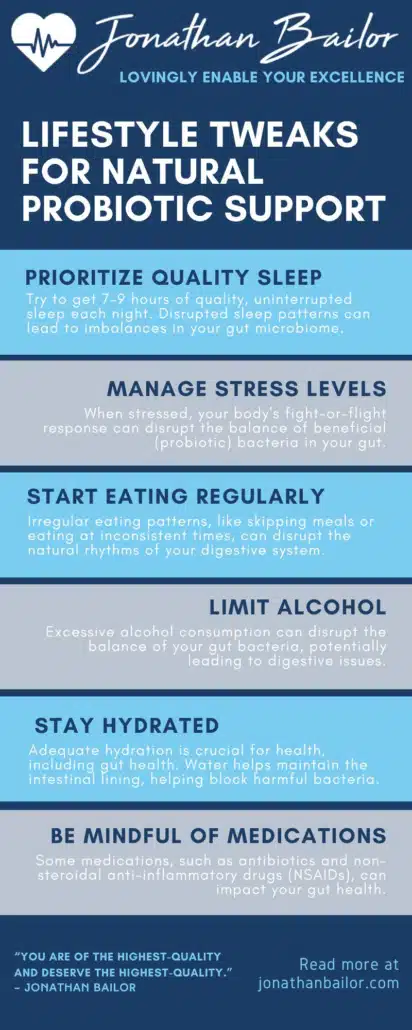
Feeling Better Is Priceless, That's Why We Don't Put A Price On It!
“It’s Like A Free and Medically Valid Version of Noom and Weight Watchers Online”
~ Dr. Doctor Matthew Oleshiak, MD
Click the 'LEARN MORE' button below for free lifetime access to the fast fix program developed by Jonathan and top Ivy League Medical Doctors
LEARN MOREP.S. It's not a free trial. It's not part of the program for free. The entire program is free, forever, for real! No credit card needed.
Enhancing Gut Health: Dietary Tweaks for Optimal Well-Being
1. Embrace Fiber-Rich Foods
One of the cornerstones of a gut-healthy diet is fiber. Soluble fiber, found in foods like Brussels sprouts, flaxseeds, and low-fructose fruits like berries, acts as fuel for beneficial probiotic gut bacteria, promoting their growth and diversity. Insoluble fiber, found in most vegetables, especially celery and legumes, adds bulk to your stool and supports regular bowel movements. By incorporating a variety of fiber-rich foods into your diet, you can nourish your gut microbiome and maintain a healthy digestive system.
2. Include Fermented Foods for Probiotics
Fermented foods are a treasure trove of probiotics—those friendly bacteria that work wonders for your gut. Yogurt, kefir, sauerkraut, kimchi, and kombucha are all excellent sources of probiotics. These live cultures can help replenish and maintain a balanced gut microbiome. Just a small serving of fermented foods each day can make a significant difference in your digestive health.
3. Reduce Added Sugar Intake
Excessive sugar consumption can negatively impact your gut health by promoting the growth of harmful bacteria and yeast. It can also lead to inflammation and increased gut permeability. To support a healthy gut, aim to cut back on foods and drinks loaded with added sugars. Opt for whole, low-sugar fruits like berries instead of satisfying your sweet tooth with processed desserts. Whole fruits provide natural sweetness, essential nutrients, and fiber.
4. Opt for Prebiotic Foods
Prebiotics are like nourishing fertilizers for your gut bacteria. They’re non-digestible fibers found in foods like garlic, onions, leeks, and asparagus. By including prebiotic-rich foods in your diet, you provide essential nutrients that support the growth and activity of beneficial (probiotic) gut bacteria. Think of it as tending to your gut garden—prebiotics help the good bacteria flourish.
5. Moderate Your Alcohol Consumption
While we focus on diet here, it’s crucial to mention that excessive alcohol intake can harm your gut. Alcohol can disrupt the balance of gut bacteria and lead to gut inflammation. To support gut health, limit alcohol consumption and be mindful of its impact on your digestive system. Opt for alcohol-free days and choose lower-alcohol options when you do indulge.
6. Stay Hydrated with Water
Adequate hydration is a critical component of a gut-healthy diet. Water helps maintain the mucus lining in your intestines, acting as a protective barrier against harmful bacteria. Dehydration can lead to constipation and hinder proper digestion. Make a conscious effort to drink enough water throughout the day, and consider herbal teas or infused water for added hydration benefits.
By making these dietary adjustments, you can provide your gut with the essential nutrients and support it needs to thrive. Remember, small changes over time can significantly improve your gut health and overall well-being.
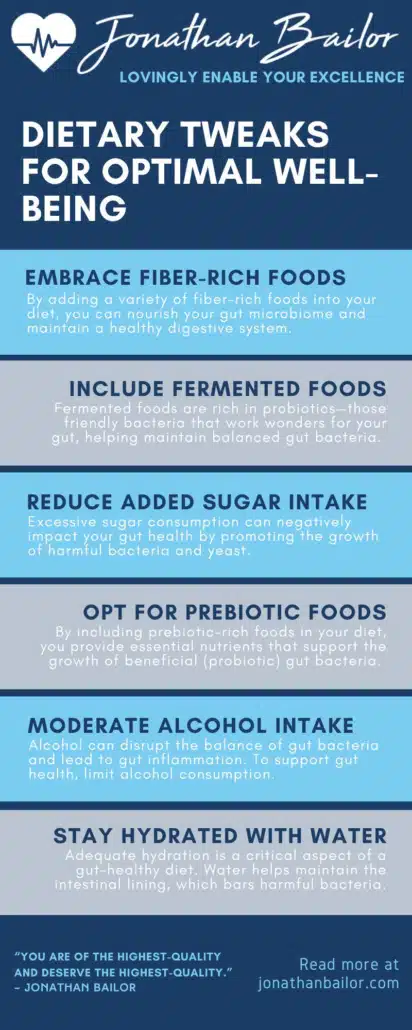
Elevate Gut Health: Physical Activity Tips for a Thriving Digestive System
1. Incorporate Gentle Stretching
Engaging in gentle stretching exercises can do wonders for your gut health. Activities like yoga or Pilates promote flexibility and help ease tension in your abdominal area. These movements stimulate blood flow to your digestive organs, potentially reducing bloating and discomfort. Adding a few minutes of gentle stretching into your daily routine can be a soothing way to support your digestive system.
2. Prioritize Post-Meal Walks
After enjoying a meal, consider taking a leisurely stroll. A short walk can aid in digestion by encouraging the movement of food through your digestive tract. It may help prevent that uncomfortable feeling of fullness and promote more efficient nutrient absorption. This simple habit can be especially beneficial after larger meals.
3. Engage in Low-Impact Exercises
Low-impact aerobic exercises like swimming or cycling can be kind to your gut. Unlike high-impact activities that may jostle your digestive system, these gentle movements can promote healthy blood circulation without causing discomfort. Regular, low-impact exercise can contribute to a more harmonious gut environment.
4. Practice Diaphragmatic Breathing
Deep, diaphragmatic breathing exercises can have a calming effect on your gut. By expanding and contracting your diaphragm, you stimulate the vagus nerve, which connects your brain to your digestive system. This stimulation can enhance digestive function and reduce stress-related gut symptoms. Incorporate diaphragmatic breathing into your daily routine to support both your gut and your overall well-being.
5. Engage in Core-Strengthening Exercises
Strengthening your core muscles can indirectly benefit your digestive system. A strong core supports your abdominal organs, helping them function optimally. Exercises like planks, leg raises, and bridges can help build core strength. A stable core can aid in maintaining healthy digestion and reducing the risk of gastrointestinal discomfort.
6. Try Tai Chi for Mind-Body Harmony
Tai Chi, often referred to as “meditation in motion,” combines gentle movements with focused breathing. This ancient practice can help reduce stress and promote relaxation, which can positively impact your gut health. Stress reduction is linked to better digestion, making Tai Chi a valuable addition to your routine for overall well-being.
By incorporating these physical activity adjustments into your daily life, you can nurture a healthier gut and promote smoother digestion. Remember, it’s not about intense workouts but rather incorporating mindful movements that support your digestive system and overall well-being.
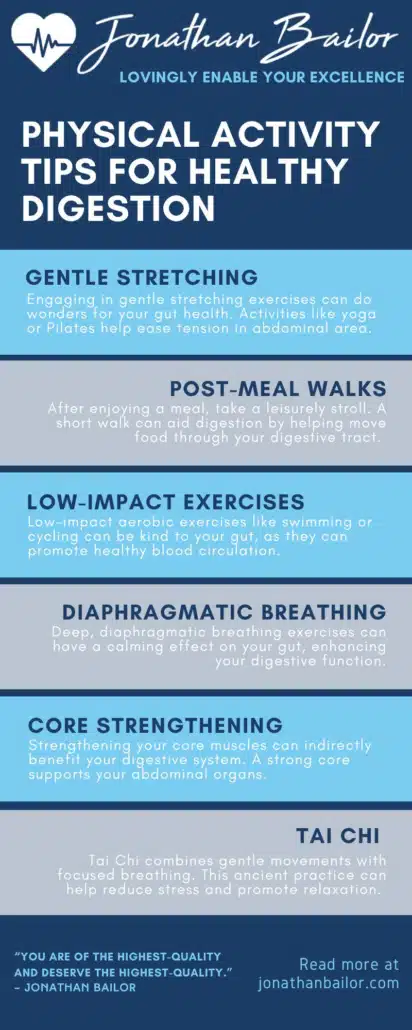
Nurturing Gut Health: Mind-Body Strategies for Digestive Well-Being
1. Practice Mindful Eating
Cultivating mindfulness during meals can transform your relationship with food and support a healthier gut. Pay close attention to the textures, flavors, and aromas of your food. Chew slowly and savor each bite, allowing your body to signal when it’s satisfied. Mindful eating can reduce overeating, enhance digestion, and promote better nutrient absorption, all of which benefit your gut health.
2. Embrace Stress-Reducing Techniques
Chronic stress can negatively impact your digestive system. You can improve your gut health by incorporating stress-reducing techniques like meditation, progressive muscle relaxation, or mindfulness meditation into your daily routine. These practices help lower stress hormones and encourage a more balanced gut microbiome with plenty of natural probiotics. A calm mind goes hand in hand with a calm gut.
3. Cultivate a Positive Gut-Brain Connection
Your gut and brain are closely interconnected through the gut-brain axis. Nurturing a positive connection between the two can profoundly affect your gut health. Engage in activities that boost your mood and emotional well-being, such as spending time with loved ones, pursuing hobbies, or practicing gratitude. A happier mind can lead to a happier gut.
4. Prioritize Adequate Sleep
Quality sleep is not only crucial for physical health but also for mental well-being. Insufficient sleep can lead to increased stress and anxiety, which can negatively impact your gut. Aim for 7-9 hours of restorative sleep each night to support a balanced gut microbiome and a calmer mind.
5. Seek Professional Support
If you’re struggling with persistent gut issues that seem to be linked to mental health, consider seeking support from a mental health professional. Both physical and psychological factors often influence conditions like irritable bowel syndrome (IBS). Therapy or counseling can help you develop coping strategies to manage symptoms and improve your overall well-being.
6. Practice Mindful Breathing Techniques
Mindful breathing exercises can help calm your nervous system and reduce stress, both of which can benefit your gut health. Techniques like box breathing or 4-7-8 breathing can be performed anywhere, providing you with quick stress relief and promoting a healthier gut environment.
Nurturing your gut health involves not only dietary and physical adjustments but also mental and emotional well-being. By incorporating these mind-body strategies into your daily life, you can create a harmonious environment that supports your digestive system and promotes overall health and happiness.
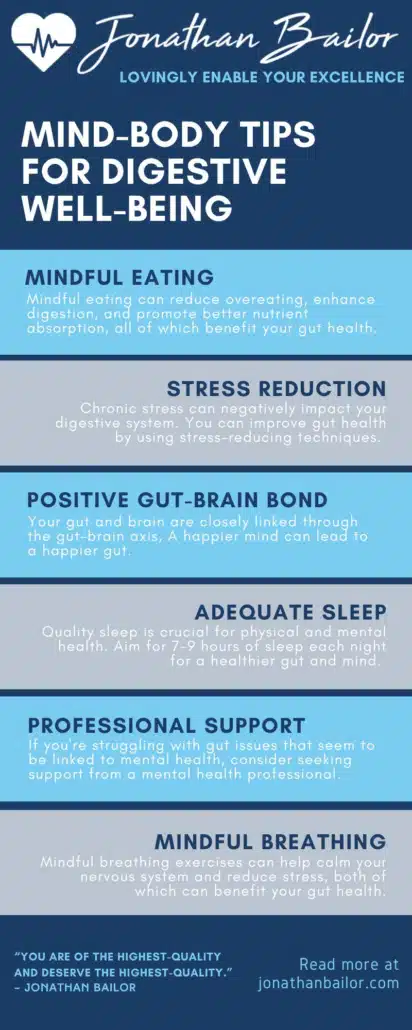
FAQ: Gut Health with Probiotics – Your Burning Questions Answered
Q1: What Are Probiotics, and How Do They Benefit Gut Health?
A1: Probiotics are live microorganisms, often called “friendly bacteria,” that can provide numerous health benefits when consumed in adequate amounts. These microorganisms are naturally present in your gut and play a crucial role in maintaining a balanced gut microbiome. Probiotics can help improve gut health by supporting digestion, enhancing nutrient absorption, and promoting a robust immune system. They also help maintain a healthy balance of gut bacteria, which is essential for overall well-being.
Q2: Can Probiotics Help with Digestive Issues Like Bloating and Irritable Bowel Syndrome (IBS)?
A2: Yes, probiotics have shown promise in alleviating digestive issues like bloating and IBS. Research suggests that certain strains of probiotics may help regulate bowel movements, reduce abdominal discomfort, and ease symptoms associated with IBS. However, the effectiveness of probiotics can vary from person to person, and not all strains may provide the same benefits. It’s essential to consult a healthcare provider before starting any probiotic regimen to determine which strains may be most suitable for your specific digestive concerns.
Q3: Are Probiotics Safe for Everyone, Including Children and Older Adults?
A3: Probiotics are generally considered safe for most people, including children and older adults. However, choosing probiotics appropriate for your age group and specific health needs is crucial. Always consult with a healthcare professional before giving probiotics to infants or young children, as their digestive systems are still developing. Similarly, older adults may benefit from probiotics, but it’s essential to consider any underlying medical conditions or medications that may interact with probiotics. As with any supplement, it’s wise to seek professional guidance to ensure safe and effective use.
Q4: Can I Get Probiotics from My Diet Alone, or Do I Need Supplements?
A4: While certain foods naturally contain probiotics, such as yogurt, kefir, sauerkraut, and kimchi, it can be challenging to obtain a consistent and adequate supply solely from your diet. Probiotic supplements can provide a more concentrated and standardized dose of beneficial bacteria. These supplements are available in various forms, including capsules, powders, and chewable tablets. Whether or not you need supplements depends on your dietary habits and health goals. If you’re looking to target specific gut health issues or ensure a consistent probiotic intake, supplements may be a valuable addition to your routine.
Q5: How Long Does It Take to See Results from Probiotic Use?
A5: The time it takes to see results from probiotic use can vary widely depending on factors such as the specific probiotic strain, the condition being addressed, and individual differences. Some people may experience improvements in digestive comfort relatively quickly, within a few days to a few weeks. However, for more chronic or complex digestive issues, it may take several weeks or even months to notice significant changes. Consistency is key when using probiotics, so taking them regularly as directed is essential. If you don’t see the desired results after a reasonable period, it’s advisable to consult with a healthcare provider to explore other options and potential underlying issues.
Taking Charge of Your Gut Health: Your Path to Wellness
In your journey to better gut health, you’ve uncovered a wealth of knowledge and practical tips. From dietary tweaks to mindful practices, you now have a toolkit for nurturing your digestive well-being. Remember, small, consistent changes can lead to significant improvements in your gut health and overall vitality.
Share this valuable information with your friends and family, so they, too, can embark on a path to wellness. Together, we can make the world a healthier place, one person at a time. Spread the word on social media, via email, or however you prefer, and let’s inspire a community of healthier, happier individuals.
Feeling Better Is Priceless, That's Why We Don't Put A Price On It!
“It’s Like A Free and Medically Valid Version of Noom and Weight Watchers Online”
~ Dr. Doctor Matthew Oleshiak, MD
Click the 'LEARN MORE' button below for free lifetime access to the fast fix program developed by Jonathan and top Ivy League Medical Doctors
LEARN MOREP.S. It's not a free trial. It's not part of the program for free. The entire program is free, forever, for real! No credit card needed.

